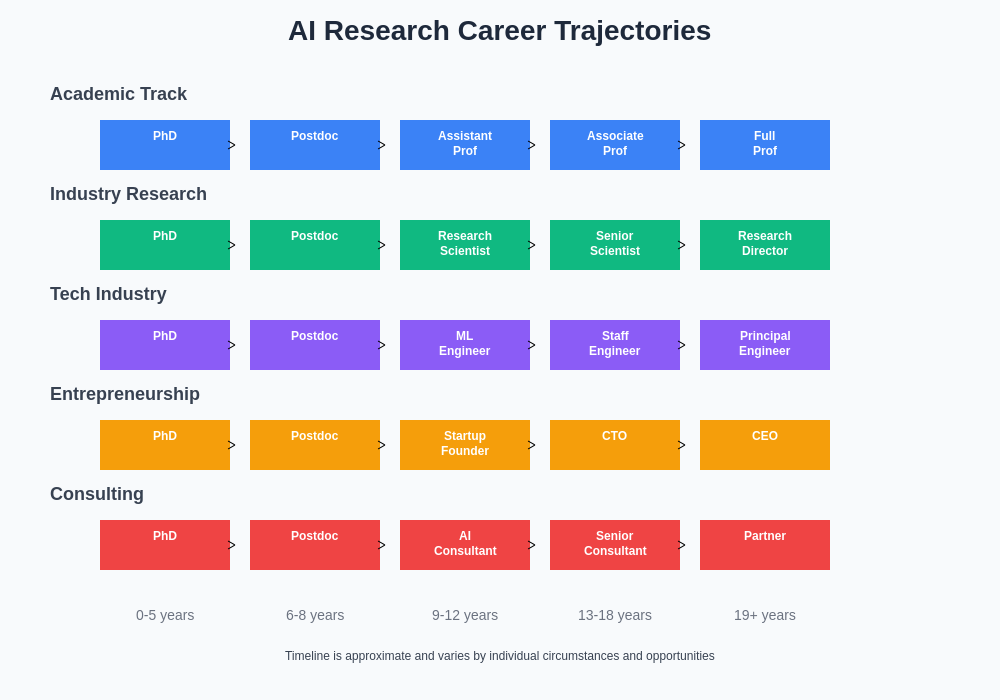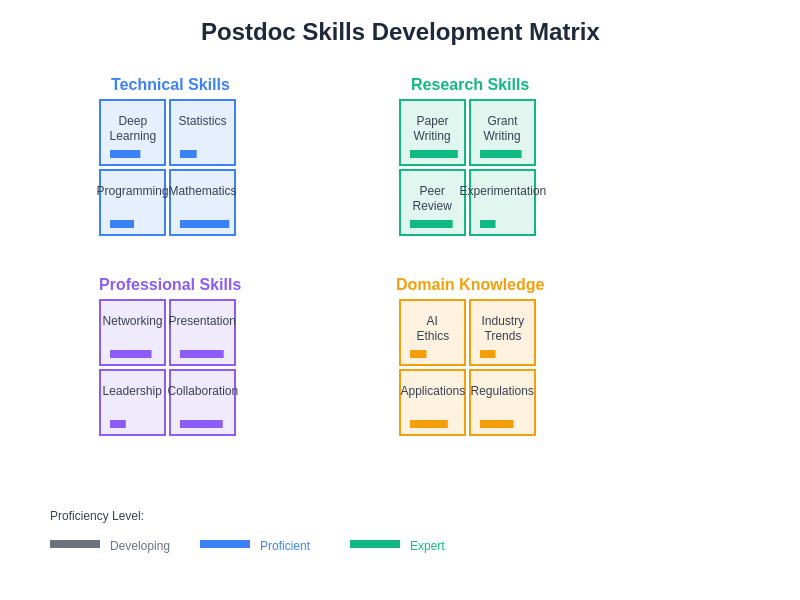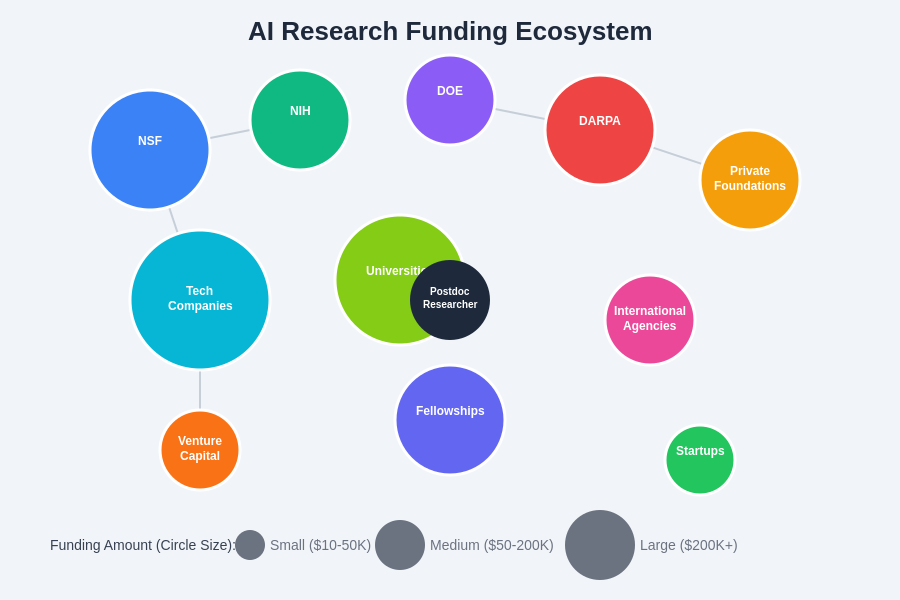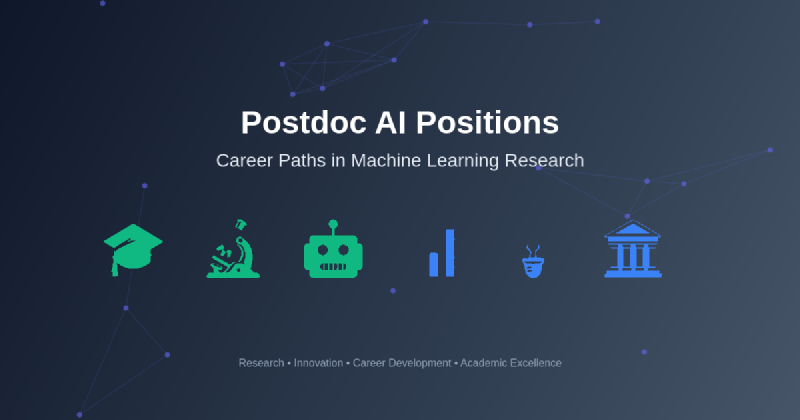The landscape of artificial intelligence and machine learning research has undergone unprecedented expansion in recent years, creating abundant opportunities for postdoctoral researchers seeking to advance their careers in this dynamic field. As AI continues to permeate various sectors of society and industry, the demand for highly skilled researchers with specialized expertise has reached new heights, making postdoctoral positions increasingly competitive and rewarding for those who successfully navigate this critical career transition period.
Discover the latest AI research trends to stay informed about cutting-edge developments that are shaping the future of machine learning and artificial intelligence research. The postdoctoral phase represents a pivotal moment in the academic journey, where emerging researchers can establish their independent research identity, develop specialized expertise, and build the foundational skills necessary for successful careers in either academia or industry settings.
Understanding the Postdoc Landscape in AI Research
The postdoctoral research environment in artificial intelligence and machine learning has evolved significantly over the past decade, reflecting the field’s rapid growth and increasing interdisciplinary nature. Modern AI postdocs find themselves at the intersection of computer science, mathematics, neuroscience, psychology, and various domain-specific applications, creating unique opportunities for researchers to develop hybrid expertise that spans multiple disciplines and methodological approaches.
Contemporary postdoctoral positions in AI research typically involve collaboration with established research groups, participation in large-scale projects funded by government agencies or industry partners, and the development of novel theoretical frameworks or practical applications. The duration of these positions generally ranges from two to four years, providing sufficient time for researchers to make significant contributions to their chosen subfields while building the publication record and professional network necessary for future career advancement.
The competitive nature of AI postdoc positions has intensified as the field has grown, with top-tier institutions and research laboratories receiving hundreds of applications for each available position. This heightened competition has elevated the standards for successful candidates, who are typically expected to demonstrate not only strong technical skills and research potential but also the ability to work collaboratively, communicate effectively with diverse audiences, and contribute to the broader research community through teaching, mentoring, and service activities.
Specialized Research Areas and Career Trajectories
Machine learning research encompasses numerous specialized subfields, each offering distinct career paths and professional opportunities for postdoctoral researchers. Computer vision research focuses on developing algorithms that can interpret and understand visual information, with applications spanning autonomous vehicles, medical imaging, robotics, and augmented reality systems. Researchers in this area often find career opportunities in technology companies, automotive manufacturers, healthcare organizations, and entertainment industries.
Natural language processing represents another rapidly expanding area of AI research, where postdocs work on developing systems that can understand, generate, and manipulate human language. This field has seen explosive growth with the development of large language models and conversational AI systems, creating numerous opportunities in technology companies, publishing organizations, educational institutions, and government agencies focused on multilingual communication and information processing.
Reinforcement learning research attracts postdocs interested in developing algorithms that can learn optimal decision-making strategies through interaction with complex environments. This field has applications in robotics, game theory, financial modeling, and autonomous systems, offering career paths in technology companies, financial institutions, manufacturing organizations, and research laboratories focused on autonomous systems development.

The progression from postdoctoral research to established career positions follows several common patterns, each requiring different combinations of technical expertise, leadership skills, and professional networking. Understanding these trajectories helps emerging researchers make informed decisions about their postdoctoral experiences and long-term career goals.
Explore advanced AI tools like Claude to enhance your research capabilities and stay competitive in the rapidly evolving field of artificial intelligence and machine learning. The integration of advanced AI assistants into research workflows has become increasingly important for postdocs seeking to maximize their productivity and research impact during their limited tenure in these positions.
Academic Career Preparation and Faculty Positions
The traditional academic career path from postdoc to faculty position remains highly competitive but continues to offer unique rewards for researchers passionate about teaching, mentoring, and conducting independent research. Successful transitions to faculty positions typically require exceptional research productivity during the postdoctoral period, evidenced by high-impact publications, successful grant applications, and recognition within the research community through conference presentations and collaborative projects.
Postdocs aspiring to academic careers must develop expertise in multiple areas simultaneously, including research methodology, grant writing, teaching pedagogy, and academic service. The ability to establish and lead independent research programs becomes crucial during the faculty application process, as hiring committees seek candidates who can demonstrate both immediate research impact and long-term potential for sustained scholarly contributions.
The academic job market in AI research has become increasingly international, with opportunities available at universities and research institutions worldwide. This global perspective requires postdocs to be flexible regarding geographic location while building research networks that span multiple countries and institutional contexts. Many successful academic careers in AI research involve collaboration with international partners and participation in global research initiatives.
Industry Transitions and Corporate Research Roles
The transition from academic postdoctoral research to industry positions has become increasingly common and attractive for AI researchers, driven by competitive compensation packages, access to large-scale datasets, and opportunities to see research translated into real-world applications. Technology companies, consulting firms, financial institutions, and healthcare organizations actively recruit postdocs with specialized AI expertise to lead research and development initiatives.
Corporate research roles often provide postdocs with access to computational resources and datasets that far exceed what is typically available in academic settings, enabling research at scales that would be impossible in university laboratories. However, these positions may involve different publication policies, intellectual property considerations, and research timelines that require adjustment from academic research practices.
The skills developed during postdoctoral research, including project management, technical communication, and interdisciplinary collaboration, translate well to industry settings where researchers must work with product development teams, business stakeholders, and regulatory compliance groups. Many industry research positions also offer opportunities for continued publication and conference participation, allowing researchers to maintain their academic profiles while pursuing commercially relevant applications.
Funding Landscape and Fellowship Opportunities
The funding ecosystem for postdoctoral AI research includes numerous sources ranging from government agencies to private foundations and corporate sponsors. National science foundations, defense research agencies, and international research councils provide fellowships that offer both financial support and prestige that enhances career prospects. These competitive fellowships typically require detailed research proposals, strong letters of recommendation, and demonstrated research potential.
Private foundations focused on AI safety, ethics, and societal impact have emerged as important funding sources for postdoctoral research addressing the broader implications of artificial intelligence development. These fellowships often encourage interdisciplinary approaches that combine technical AI research with considerations of policy, ethics, and social impact, preparing researchers for careers that bridge technical and societal concerns.
Corporate fellowship programs have become increasingly common as technology companies seek to build relationships with emerging AI researchers and identify potential future employees. These programs often provide financial support while offering access to industry datasets, mentorship from industry researchers, and opportunities to work on problems of direct commercial relevance.
Access comprehensive research tools through Perplexity to enhance your ability to conduct literature reviews, track funding opportunities, and stay informed about emerging trends in AI research funding. The ability to efficiently gather and synthesize information from diverse sources has become crucial for postdocs seeking to identify and pursue appropriate funding opportunities.
Building Research Networks and Professional Relationships
The development of professional networks during the postdoctoral period represents one of the most critical factors determining long-term career success in AI research. These networks provide access to collaboration opportunities, job openings, funding information, and peer review processes that shape research careers. Effective networking requires active participation in conferences, workshops, and professional societies while maintaining ongoing communication with colleagues and mentors.
Conference participation extends beyond simply presenting research results to include organizing workshops, serving on program committees, and participating in panel discussions that establish researchers as thought leaders in their respective subfields. These activities build visibility within the research community while developing leadership skills that prove valuable in both academic and industry career paths.
Mentorship relationships, both as mentees and mentors, play crucial roles in career development during the postdoctoral period. Experienced faculty members, industry researchers, and senior postdocs provide guidance on career decision-making, research direction, and professional development. Simultaneously, mentoring graduate students and junior researchers helps postdocs develop teaching and leadership skills while building networks with emerging researchers.
Skill Development and Technical Expertise
The rapid pace of advancement in AI research requires postdocs to continuously update their technical skills and methodological expertise throughout their research careers. Programming proficiency in languages such as Python, R, and Julia has become essential, along with familiarity with deep learning frameworks, distributed computing systems, and version control tools that enable collaborative research and reproducible results.
Mathematical foundations in statistics, linear algebra, optimization theory, and probability remain crucial for conducting rigorous research and developing novel algorithms. However, the increasing complexity of AI systems has also created demand for researchers with expertise in areas such as systems engineering, human-computer interaction, and domain-specific applications that require interdisciplinary knowledge and collaboration.
Communication skills have become increasingly important as AI research impacts broader society and requires explanation to non-technical audiences including policymakers, business leaders, and the general public. Postdocs who develop strong written and oral communication abilities often find enhanced opportunities for career advancement in both academic and industry settings.
Research Ethics and Responsible AI Development
The growing recognition of AI’s societal impact has elevated the importance of ethical considerations and responsible development practices in postdoctoral research. Researchers are increasingly expected to understand and address issues such as algorithmic bias, privacy protection, fairness in machine learning systems, and the environmental impact of large-scale computational research.
Ethics training and awareness have become integral components of postdoctoral education, with many programs requiring participation in responsible conduct of research training and ethics review processes. This emphasis on ethical research practices prepares postdocs for careers in an environment where AI development must balance technical innovation with societal responsibility and regulatory compliance.
The interdisciplinary nature of AI ethics research has created opportunities for postdocs with backgrounds in philosophy, law, policy studies, and social sciences to contribute to technical AI research while bringing crucial perspectives on the societal implications of algorithmic systems. These interdisciplinary collaborations enrich the research environment while preparing technically trained postdocs to address the complex challenges of responsible AI development.

The multidimensional nature of skill development required for successful AI research careers encompasses technical competencies, research methodologies, professional skills, and ethical awareness. Postdocs must strategically develop expertise across these domains while maintaining focus on their primary research contributions and career objectives.
International Opportunities and Global Research Collaboration
The international nature of AI research has created abundant opportunities for postdocs to work in diverse geographic and cultural contexts while building global research networks. Many countries have invested heavily in AI research infrastructure and offer attractive postdoctoral fellowship programs designed to attract international talent and foster collaborative research relationships.
European research institutions, through programs such as Marie Curie Fellowships, provide opportunities for researchers to work across multiple countries while developing expertise in different research traditions and methodological approaches. These international experiences often prove valuable for subsequent career opportunities in both academic and industry settings that increasingly operate on a global scale.
Asian countries, particularly China, Japan, and Singapore, have established world-class AI research institutions and offer competitive postdoctoral positions with access to unique datasets, computational resources, and research collaborations. These opportunities expose researchers to different approaches to AI development and applications while building cultural competence that proves valuable in an increasingly globalized research environment.
Entrepreneurship and Startup Opportunities
The commercial potential of AI research has created unprecedented opportunities for postdocs to translate their research into entrepreneurial ventures and startup companies. Many successful AI companies have been founded by researchers who identified commercial applications for technologies developed during their academic research, creating pathways from postdoctoral research to entrepreneurial leadership.
Incubator programs, accelerators, and university technology transfer offices provide support for postdocs interested in commercializing their research through startup ventures. These programs offer training in business development, intellectual property management, and fundraising while providing access to networks of entrepreneurs, investors, and business mentors.
The skills developed during postdoctoral research, including problem-solving, project management, and technical leadership, translate well to entrepreneurial contexts where researchers must build teams, develop products, and navigate competitive markets. Many postdocs pursue entrepreneurial ventures while maintaining academic affiliations through consulting relationships or part-time positions that provide flexibility during startup development phases.
Long-term Career Planning and Professional Development
Strategic career planning during the postdoctoral period requires careful consideration of personal goals, market opportunities, and skill development priorities. The decisions made during this critical career phase often determine long-term professional trajectories and require balancing immediate opportunities with future aspirations and family considerations.
Professional development activities such as leadership training, project management certification, and business education can enhance career prospects while providing skills that prove valuable regardless of the specific career path ultimately pursued. Many successful AI researchers credit their participation in professional development programs during their postdoctoral years with providing crucial skills for subsequent career advancement.
The dynamic nature of AI research and its applications suggests that career flexibility and adaptability will remain important throughout professional development. Postdocs who develop diverse skill sets and maintain broad professional networks often find themselves better positioned to capitalize on emerging opportunities and navigate changing market conditions throughout their careers.

The complex ecosystem of research funding sources available to postdoctoral researchers requires strategic navigation and understanding of different agencies’ priorities, application processes, and funding mechanisms. Success in securing funding often determines the scope and impact of research activities during the postdoctoral period.
Conclusion and Future Outlook
The postdoctoral experience in AI and machine learning research represents a unique opportunity to develop specialized expertise, build professional networks, and establish research independence during a period of unprecedented growth and opportunity in the field. The decisions made and skills developed during this critical career phase often determine long-term professional success and satisfaction in diverse career contexts.
As artificial intelligence continues to transform industries, societies, and scientific research itself, the demand for highly trained researchers with postdoctoral experience is expected to remain strong across academic, industry, and entrepreneurial contexts. The interdisciplinary nature of AI research suggests that postdocs with diverse backgrounds and collaborative skills will be particularly well-positioned for future opportunities.
The evolution of AI research toward addressing complex societal challenges and developing responsible AI systems creates opportunities for postdocs to contribute to meaningful research while building careers that balance technical innovation with social impact. This alignment of personal values with professional opportunities often proves crucial for long-term career satisfaction and success in the rapidly evolving field of artificial intelligence research.
Disclaimer
This article is for informational purposes only and does not constitute professional career advice. Career opportunities and requirements in AI research may vary significantly based on individual circumstances, geographic location, and market conditions. Readers should conduct their own research and consult with career advisors, mentors, and industry professionals when making important career decisions. The rapidly evolving nature of AI research may affect the relevance of specific information contained in this article.
